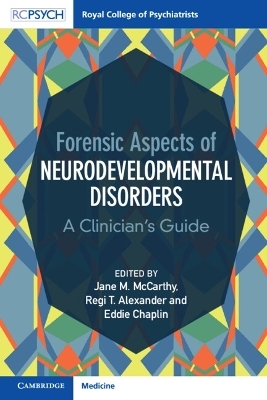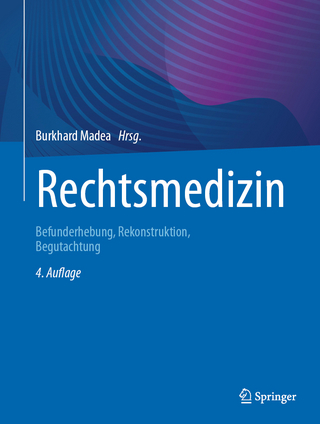
Forensic Aspects of Neurodevelopmental Disorders
Cambridge University Press (Verlag)
978-1-009-36094-4 (ISBN)
Evidence has shown a high prevalence of neurodevelopmental disorders amongst offenders in custodial institutions. Bringing together the latest knowledge and understanding, this book describes the needs of offenders who present with neurodevelopmental disorders, including autism spectrum disorder, ADHD, intellectual disability and foetal alcohol spectrum disorders. The book covers aetiology, prevalence, comorbid mental disorders, legal issues, assessment including risk assessments, diagnosis and therapeutic approaches. It describes care pathways through the criminal justice system across the UK and internationally, including the current and ongoing developments of services for this group. With contributions from experts in the field including psychiatrists, researchers and psychologists, this book provides a comprehensive summary of the evidence whilst ensuring the focus is for the everyday clinician working in this area. It is an invaluable resource for psychiatrists and other professionals working across the criminal justice system and within forensic services.
Jane M. McCarthy is a Consultant Psychiatrist at Sussex Partnership NHS Foundation Trust, Honorary Associate Professor in Psychological Medicine at University of Auckland, New Zealand and Visiting Senior Lecturer at the Department of Forensic and Neurodevelopmental Sciences, King's College London, UK. She has over twenty-seven years of experience as a psychiatrist working in the UK and New Zealand with people with neurodevelopmental disorders presenting across forensic services, including prisons and courts. She has also held a number of national and international roles, including Clinical Advisor on Adults with Autism for the Department of Health, England. Regi T. Alexander is a Consultant Psychiatrist at Hertfordshire Partnership University NHS Foundation Trust and Visiting Professor at the University of Hertfordshire, UK. He has over 22 years of experience as a psychiatrist, with research interests focusing on the interface between neurodevelopmental disorders, psychiatric illnesses and offending behaviour. An author over 100 publications, he was an Associate Dean of the Royal College of Psychiatrists and is currently President of the Royal Society of Medicine's Intellectual Disability Forum, Editor of the Oxford Textbook of Psychiatry of Intellectual Disability and Convenor of RADiANT – a research network of NHS Trusts, academics, patients, family members and community leaders. Eddie Chaplin is Professor of Mental Health in Neurodevelopmental Conditions and Director for the Foundation for People with Learning Disabilities at The Institute of Health and Social Care, London South Bank University, UK. His areas of interest include people with intellectual disability, autism and ADHD in the Criminal Justice System, mental wellbeing training and peer mentoring via co-production with people with intellectual disability and autism. He is currently Head of the Scientific Committee of the European Association of Mental Health and Intellectual Disabilities (EAMHID) and has edited the journals Advances in Autism and Advances in Mental Health and Intellectual Disabilities.
Part I. An Overview: Definitions, Epidemiology and Policy Issues: 1. Introduction Dr Jane McCarthy, Professor Regi Alexander and Professor Eddie Chaplin; 2. Aetiology of neurodevelopmental disorders Dr Jana de Villiers; 3. Overview of offenders with intellectual disability Verity Chester Priyanka Tharian, Matthew Slinger, Anto Varughese and Professor Regi Alexander; 4. A critical overview of offenders with attention deficit hyperactive disorder Susan Young, Kelly Cocallis, Corey Lane and Mark David Chong; 5. Overview of offenders with autism spectrum disorders David Murphy and Clare S. Allely; 6. Associations between ASD and types of offences Clare S. Allely and David Murphy; 7. Overview of young people with neurodevelopmental impairments in contact with the youth justice system Professor Prathiba Chitsabesan, Professor Nathan Hughes and Professor Huw Williams; 8. Overview of offenders with foetal alcohol spectrum disorders Dr Raja Mukherjee, Penny A. Cook, David Gilbert and Clare S. Allely; 9. The role of sub threshold neurodevelopmental disorder in offending behaviour Professor Eddie Chaplin and Dr Jane McCarthy; 10. Comorbid mental disorders and neurodevelopmental conditions Kiriakos Xenitidis, Caryl Marshall and Jane McCarthy; Part II. Assessment and Therapeutic Approach: 11. ADHD: assessment and therapeutic approaches within forensic settings Dr Bhathika Perera, Dr Maheera Tyler and Dr Zaid Al-Najjar; 12. ASD – Assessment and therapeutic approaches within forensic settings Dr David Murphy and Dr Jane Radley; 13. Intellectual disability: assessment and therapeutic approaches within forensic settings Ken Courtenay and Dr Mhairi Duff; 14. Risk assessments in people with neurodevelopmental disorders Dr Catrin Morrissey; 15. Assessment and treatment of young offenders Dr Louise Theodosiou and Dr Rachel Elvins; Part III. Criminal Justice Pathways and Legal Issues: 16. Criminal justice pathways and neurodevelopmental disorders Professor Andrew Forrester, Dr Iain McKinnon and Dr Samir Srivastava; 17. The Mental health act and other relevant legislation in relation to neurodevelopmental disorders in the UK Harm Boer, Eleanor Brewster and Ryan McHugh; 18. Fitness to plead and neurodevelopmental disorders Penelope Brown, Salma Ali and Elizabeth Harris; 19. Forensic services for neurodevelopmental disorders – An English perspective. Dr John Devapriam and Dr Harinder Bains; 20. Offenders with neurodevelopmental disorders and/or intellectual disabilities in four nordic countries Erik Søndenaa and Søren Holst; 21. Forensic neurodevelopmental disabilities – A perspective from Ontario, Canada on pathways and services Voula Marinos, Lisa Whittingham, Jessica Jones and The Hon. Mr. Justice Richard D. Schneider ; 22. Forensic aspects of neurodevelopmental disabilities – An Australasian perspective Dr Cathy Franklin; 23. Concluding comments
| Erscheinungsdatum | 07.11.2022 |
|---|---|
| Zusatzinfo | Worked examples or Exercises |
| Verlagsort | Cambridge |
| Sprache | englisch |
| Maße | 150 x 230 mm |
| Gewicht | 523 g |
| Themenwelt | Geisteswissenschaften ► Psychologie ► Klinische Psychologie |
| Medizin / Pharmazie ► Medizinische Fachgebiete ► Psychiatrie / Psychotherapie | |
| Studium ► 2. Studienabschnitt (Klinik) ► Rechtsmedizin | |
| ISBN-10 | 1-009-36094-9 / 1009360949 |
| ISBN-13 | 978-1-009-36094-4 / 9781009360944 |
| Zustand | Neuware |
| Informationen gemäß Produktsicherheitsverordnung (GPSR) | |
| Haben Sie eine Frage zum Produkt? |
aus dem Bereich


